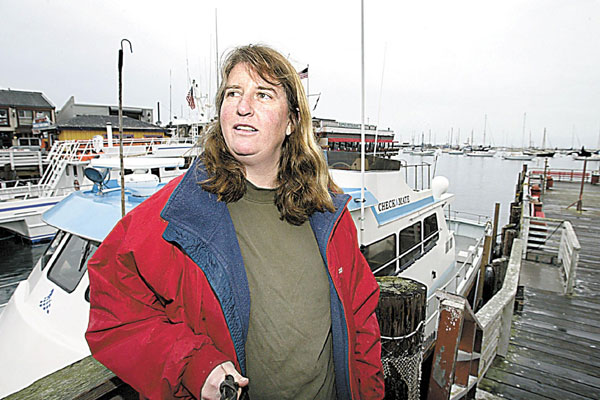Much Ado About Blubber: Marine Biologist Faces Fines, Probation for Research
Evan Bernick /
Nancy Black has dedicated her career to the research and conservation of wildlife. Now, she will have a criminal record and potentially faces a $100,000 fine, five years’ probation, and 300 hours of community service. Because of blubber.
We previously wrote about Nancy, a nationally renowned marine biologist who has been described as the “guru of killer whales in Monterey Bay.” Nancy, who has a permit to research orcas, operates two whale-watching boats to support her research.
On April 25, 2004, and again on April 11, 2005, Nancy and her crew encountered a pod of orcas feasting on the blubber of a dead gray whale. In order to film this underwater activity, Nancy instructed her crew to remove a piece of the blubber, attach it to the boat with a rope, and put it back in the water.
In an unrelated incident, on October 12, 2005, the captain of one of her vessels whistled at a humpback whale hoping that the noise would keep the whale in the vicinity. A crew member on her other boat encouraged passengers to make similar noises. Black reprimanded both employees for these actions.
When the captain’s wife called the authorities to find out whether her husband had done anything wrong, an investigator with the National Oceanic and Atmospheric Administration initiated an investigation into potential harassment of the whale, a federal offense. He contacted Nancy, who told him that she had a videotape of the incident. She voluntarily provided him with the videotape, but did not tell him that she had edited it to remove what she thought was extraneous footage; it included the captain whistling, but not the other boat’s crew member egging on the passengers.
On January 5, 2012, the Department of Justice filed a four-count indictment. Not against the whistling captain. Not against the crew member. Against Nancy.
She was charged with two felony counts for providing an edited video to the officer and failing to tell the officer that it was edited, as well as two misdemeanor violations of the Marine Mammal Protection Act (MMPA) for “feeding” killer whales. The government also sought forfeiture of her boats. In order to avoid the possibility of a felony conviction, prison time, and losing her boats, on April 23, Nancy pleaded guilty to one of the misdemeanor charges in return for the other charges being dismissed.
Nancy admitted that she removed the blubber and then returned it to the water, something not explicitly authorized by her permit. She also admitted she edited the video, which “could have” impeded the investigation.
That is all it took for this esteemed scientist and whale-lover to be branded a criminal.
The use of the MMPA in this case makes a mockery of congressional intent: As its title indicates, the statute was designed to protect mammals—not to impede harmless research.
It is outrageous that the government is extracting a pound of flesh from Nancy over a few pounds of blubber.
The Heritage Foundation’s project USA vs. YOU spotlights the flood of criminal laws threatening our liberties. Explore more stories of overcriminalization and find out what you can do to reverse this trend.

